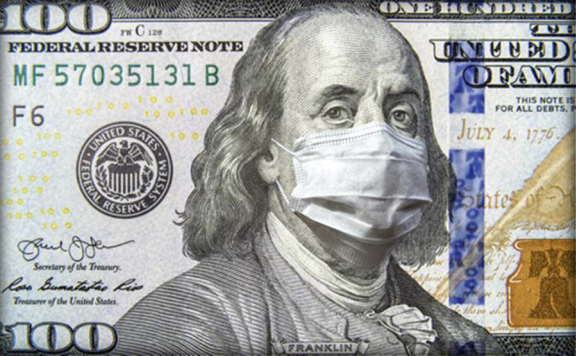Nature isn’t the only entity that abhors a vacuum; apparently, the courts do as well. After a slow start perhaps attributable to the initial nationwide COVID-19 shutdown, Coronavirus-related litigation is increasing, with lawsuits over a variety of issues from employment law to bankruptcy filings to freedom of religion. Headline making remote meeting platform Zoom suffered a setback when the rapid conversion to remote work brought to light vulnerabilities in Zoom’s technology and company behaviors, for which they are being sued in multiple actions. However, Zoom’s high-profile legal battles are just a few of several thousand COVID-19 related lawsuits. There are even apps to track COVID-19 litigation, potentially proving that whatever you’re tracking – there’s an app for that. This novel virus seems to be spawning novel changes with regard to litigation in some very interesting ways.
Counting Cases
A LexisNexis venture, Lex Machina, is a COVID-19 litigation analytics app that currently reports over 1,500 cases mentioning the Coronavirus have been filed in federal district courts since February 24, 2020, with the peak of cases filed (so far) in the last week of May 2020 (https://law.lexmachina.com/apps/covid). The app also shows that while copyright cases are way down compared to a year ago, product liability cases are up over 1100% – we are not happy consumers (Ibid). Another COVID-19 lawsuit tracker which tracks federal and state courts currently shows the nationwide total for lawsuits eclipsing 3,100 cases (https://www.huntonak.com/en/covid-19-tracker.html). While the numbers are impressive to ponder, the cases themselves are also worth consideration.
Masses of Class Action
Class action lawsuits are a large segment of the COVID-19 litigation numbers, which makes sense when the nature of a pandemic is considered. In Lange v. 24-Hour Medical Staffing Services LLC, the plaintiff, a traveling nurse, filed a class action suit on behalf of all employees of the defendant alleging a list of California labor law violations, as well as allegations that the defendant failed to protect employees from COVID-19 by failing to provide adequate personal protective equipment (PPE) (CA Super. Court, Case 30-2020-01140958-CU-OE-CXC, 2020; found at https://btlaw.com/-/media/files/blog/lange-v-24hour-medical.ashx). This case is illustrative of many of the cases filed by employees of medical organizations where a lack of PPE is the basis of a claim for an unsafe work environment. In addition to California, cases of this type have been filed in New York, Florida, New Jersey, and Alaska. In order to help shield healthcare providers from devastating lawsuits, states including Connecticut, Massachusetts, New Jersey, and New York on the East Coast, and Illinois and Michigan in the Midwest have enacted protective legislation, with other states, and US Senate Majority Leader McConnell looking to do the same (https://www.natlawreview.com/article/class-action-litigation-related-to-covid-19-filed-and-anticipated-cases-updated-june and https://www.washingtonpost.com/world/national-security/771-lawsuits–and-counting-wave-of-virus-litigation-hits-businesses-across-the-us/2020/05/01/6f7c015c-89c3-11ea-9dfd-990f9dcc71fc_story.html). While employment litigation is always contentious, consumer claims aren’t content to take second place by any means. Entertainment giants like StubHub, Ticketmaster, and LiveNation have all been hit with suits over event cancellations and ticket refunds, as have sports organizations such as the National Hockey League and World Triathlon Corp (https://www.natlawreview.com/article/class-action-litigation-related-to-covid-19-filed-and-anticipated-cases-updated-june). In Ajzenman v. Office of the Comm’r of Baseball (Central Dist. Cal. No. 2:20-cv-03643, 2020), the plaintiff claims on behalf of ticketholders of Major League Baseball games that the league classified all games as postponed in order to avoid issuing refunds, a move they say violates California’s Consumer Legal Remedies Act and Unfair Competition Law.
Remote Education Is Not the Same
In a case which brought to light Harvard University’s $40 billion endowment, Barkhordar v. Harvard University, (US Dist. Court, Mass. 1:20-cv-11203, 2020) complains among other issues:
The online learning option Harvard offered following the termination of its in- person services is subpar in practically every aspect: lack of facilities, lack of materials, lack of efficient classroom participation, and lack of access to faculty. Moreover, students have been deprived of the opportunity for collaborative learning and in-person dialogue, feedback, and critique. The remote learning option is in no way equivalent to the in-person education that Plaintiff and other Class Members were promised in exchange for their commitment to attend Harvard and the tuition and fees many of them paid during the Spring 2020 Term.
Harvard isn’t alone in facing lawsuits from unsatisfied remote scholars. Reputable colleges and universities such as Georgetown University, Santa Clara University, University of Southern California, Dartmouth College, and University of Illinois are familiar names among over one hundred academic institutions being sued in conjunction with COVID-19 lawsuits.
All Rise
While it may be some time before we again sit in a classroom or a stadium, we know the courts will remain full to capacity. The extent to which the myriad of claims made in COVID-19 lawsuits have merit will be just as varied as the cases themselves. What is likely to be the most common outcome is that no matter the type of organization or industry, the Coronavirus pandemic will change the way we do business in this country, with or without protective legislation from states or the federal government, and if we don’t, there’ll be a lawsuit for that.
Please direct questions and inquiries about electronic discovery, computer forensics, cybersecurity and data analytics to info@digitalmountain.com.
